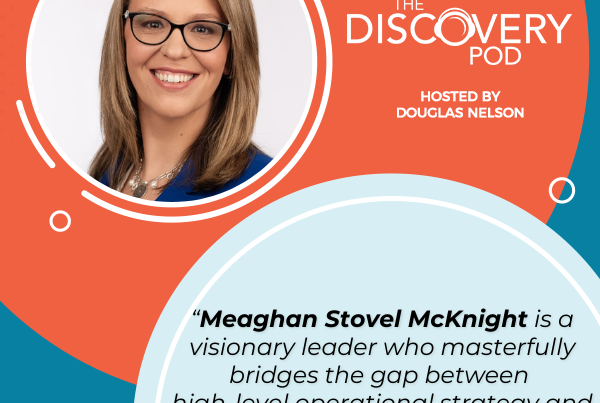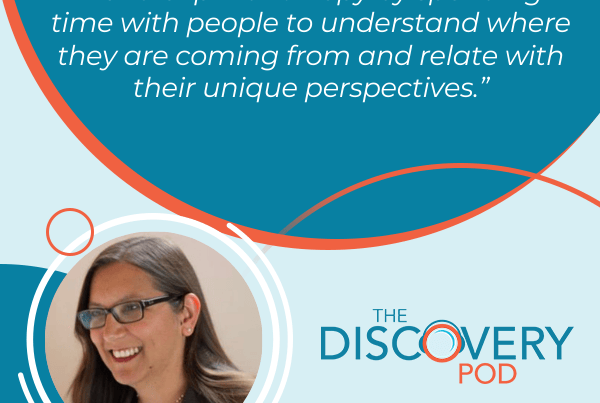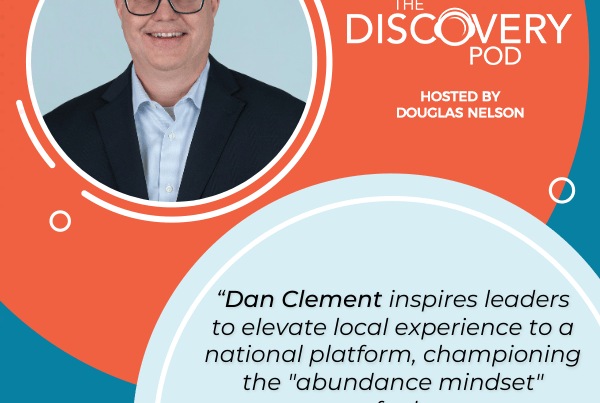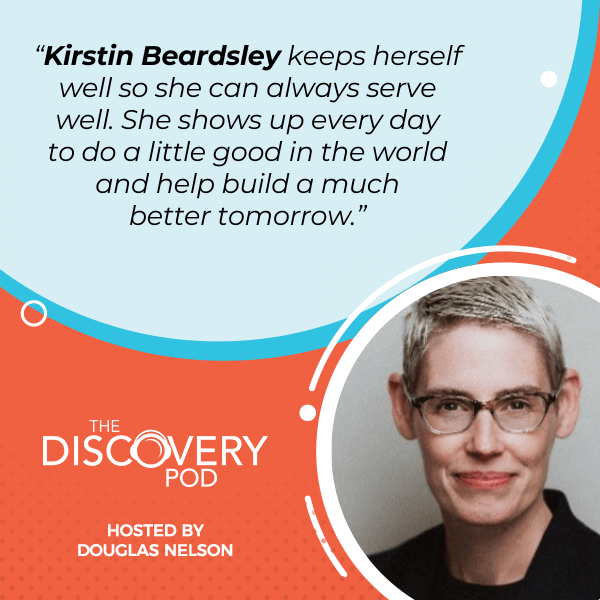
With food insecurity and waste getting worse year by year, food banks are becoming a crucial necessity in saving people’s lives. Kirstin Beardsley, CEO of Food Banks Canada, shares how they are coordinating a national network to serve local communities and save them from severe hunger. In this conversation with Douglas Nelson, she explains how food banks are mainly operated through volunteerism, their biggest problems in recruitment, and the major hurdles being faced by their frontliners. Kirstin also opens up about the challenge of staying committed to addressing the unsustainable demand for food – even when they have to make impossible choices.
—
Listen to the podcast here
Leading Through Crisis With Kirstin Beardsley, CEO, Food Banks Canada
In this episode, we’re joined by Kirstin Beardsley, Chief Executive Officer of Food Banks Canada. Kirstin took on the role in 2022 and now leads a national network of over 51,00 Food Banks and community agencies across Canada. With more than a decade of experience at Food Banks Canada, including as Chief Network Services officer, she’s been at the center of major strategic initiatives in system-wide transformations all across the country. As she shares in our episode, Kirstin has a deep understanding of food insecurity in Canada and a strong commitment to the vision of a country where no one goes hungry. Kirstin is known for her passion for the people behind food banking, those who were working every day to support their communities.
In this episode, she talks a lot about the organization coordinating the efforts at a national level for an organization and a service that is intensely rooted in community, how to tell a national story with local impact over and over again and to do it effectively and motivate volunteers to be in a central park of getting the job done. This is an episode of someone who has thought deeply about their cause, purpose and their organization. It was a privilege to connect with Kirstin. I invite you all to enjoy reading about her leadership, her vision and the outcome of all of her hard work.
—
Welcome to the show, Kirstin.
Thanks for having me.
Kirstin Beardsley Of Food Banks Canada
We are going to have a wide-ranging and hard-hitting conversation. I’m sure of it. As we as we get into that or before we get into that, tell our readers a little bit about the role of Food Banks Canada and the organization that you lead.
Food Banks Canada is a national charitable organization with a mission to relieve hunger today and prevent hunger tomorrow in collaboration with the food bank network across Canada. We work in collaboration with eleven provincial and territorial food banking associations. They have 800 members amongst them that we work with and in turn, those serve over about 5,500 other organizations on the ground. Most people know what a food bank is. Part of the work at a national level is making sure that the system that gets people food is strong. The other part of our mission as an organization is advocating for long-term policy solutions so that fewer people need food banks in the future.
We’ll get into the advocacy stuff because I have lots of questions for you on that. Before we get there, one of the things that jumps out at me about the work of Food Banks Canada. When people think of food banks, they think of handing food to people who need it very one-on-one and very hyperlocal in terms of serving the people in the communities that are served. How do you think of it in your role as head of Food Banks Canada connecting that very one-to-one work that happens at a local food bank to the national story that you and your colleagues are telling?
Food banking is that story. It is the magic of communities coming together to support our neighbors and replicated by thousands right across the country. I’ll say, it is off the top wonderful. I’m never short on inspiration on a daily basis because I can witness this magic of folks coming together to do this human work of making sure folks around us have the food they need to thrive. Where I see Food Banks Canada playing a role, we are a servant organization. I have no delusions. I know the hard work is done at the front lines.
Food banks are the result of communities coming together to support neighborhoods, and this system has been replicated by thousands across the country. Share on XThat is the work of the folks who power this movement. Our work is to make sure that there is a cohesion across the country. One of the interesting things about food banking that gets its hooks in you, and I don’t want to say just as in a diminishing way, but it’s not just about the community service. There’s a food procurement piece. There’s a logistics piece. How do you get food from one part of the country to another part of the country?
Some of that requires people or organizations like Food Banks Canada looking at the country in a different way. We also have a role of making sure that there are parts of the country that experienced food insecurity at a much higher rate. For example, the far north, or there are just geographies in Canada where there hasn’t been a lot of service and a lot of food banking established. How do we make sure that we’re, as a system, being responsive?
It doesn’t matter if you’re in Saint John’s or Iqaluit or Downtown Vancouver that you have access to food. As we talked about the advocacy piece, how do we make sure that the voices of the folks that are being served by food banks are resonating in the halls of power and we’re being a conduit to that very local relationship right up to the ears of cabinet ministers and folks that could put in place policy to make change.
How similar is the work of a food bank in Saint John’s, Iqaluit or Downtown Vancouver?
What I say a lot is, the one constant thing in food banking is its diversity.
We’re all different in what makes us the same.
At the heart of it, food banks are giving food. Some food banks give food to individuals directly. Some food banks only give food to other organizations. It’s about offsetting those community organization’s food budgets. For some, it’s about the individual food budgets, but it is about getting the food, finding the food and getting it out into their community. That’s the core of it. When you look at Saint John’s to Vancouver to Iqaluit, it’s very different, the how and the why.
I’d say the why is probably the same across the country. Maybe that’s what we all do have in common, but the how of it is wildly different. We’ve got some food banks where the majority of the food they procure is fresh. Vancouver being one of them. They’re handling a lot of refrigerated products. You’ve got some food banks that are still mostly handling non-perishables. Although, there’s a growing focus on fresh food.
In Iqaluit, the challenge of getting food into the community, it’s usually by boat. It’s purchased once a year. It arrives at the end of summer. That’s the food in that community and unless there’s funds to ship it up by airplane, there’s no other way to get food into the community. Very little surplus food in the Northern communities to act as sources of donation. It’s very different but at its core, it’s just good people trying to do a little good in the world and showing up every day to help folks who need it. That’s what keeps us together. It’s fun to think of all the different ways that’s being done across the country.
How Food Banks Addresses Unsustainability
I’m not surprised to hear that things are different in all of our readers and anyone who’s paying attention anywhere in the social profit sector has heard the demands or the needs that food banks across Canada are trying to serve have been increasing and dramatically so. The number of individual food banks have been ringing the alarm bell that what they’re doing is unsustainable and that’s a common word that we hear in relation to food banking over 2024. From your perspective, what does that unsustainability mean? How are organizations responding to meeting the need or doing their best to meet that need?
I don’t want to sound over the top, but heroic is how I would describe how food banks are stepping up. I can’t think of another type of organization or company that could absorb. We’ve seen a 90% increase nationally since prior to the pandemic since 2019. You’re doubling food bank use and that’s a national number. There are some communities that have seen a much higher rate of growth. Food banks are massive master problems solvers.
Coming into work and solving how we are going to get more food and make sure our communities are fed? That’s been the driving question of food banks for the last number of years. There is a limit. There’s limitations in terms of just the size of building a food bank has or the tipping point between the number of people in a community who rely on the food bank now, versus being able to donate and where that sits in any particular community.
Get that amount of food. The food banks aren’t meant to be serving when you’re looking at some communities. It’s 10% or more of the population. That’s not what a food bank was designed to do and it is heroic how food banks have stepped up but there is a physical limit. Not to mention a human limit where you’re asking people again every day to step up and solve new problems. It’s an impossible situation. It’s discouraging, quite frankly, because it feels some days like we’re the only ones who know the depth of the problem.
As you said, food banks across the country have been ringing the alarm for a while now. It doesn’t feel like things are shifting. That’s discouraging. When we say unsustainable, it’s this upper limit where we don’t want to be turning people away. We don’t want to be having to make decisions about who gets food and who doesn’t. We don’t want to be making these awful choices about limiting the amount of food because so many people are coming through the door. We’re starting to see them in the system.
Volunteerism: The Lifeblood Of Food Banks
One of the other hallmarks of the food bank system at least in the experience that we’ve had here at The Discovery Group and our work with food banks is the tremendous reliance on volunteerism. Volunteers more than any other place in the sector that I’ve seen in my career, those volunteers are central to the work of many food banks. Many organizations are struggling to attract and retain volunteers and recruit new ones. What’s the role of volunteers and what’s the outlook for volunteers and food banks across the country?
Food banks are powered by volunteers. There’s no doubt to the tune of thousands across the country. Still about 40% of the food banks in our system are entirely volunteer run. I would say that there’s a bit of a rural urban split here. We’re seeing in large urban centers, especially with active business sectors, there is a lot of interest in volunteerism. There’s a lot of companies that see it as a team building opportunity and a lot of employees who are asking for this social engagement as part of how they engage with their employer.
We’re seeing less of a concern in some of those urban areas but we’re seeing a big concern in declining volunteerism, especially in smaller communities and in particular where the food bank is entirely volunteer run. It’s been hard to recruit that next generation that wants to take on what is often a full-time volunteer job in a local community. We’re watching the declining rates of volunteerism pretty closely.
We are watching certain pockets of food banks pretty closely to make sure that there is some sustainability because we can’t let communities not have access to service. I would say it’s one of the areas where it’s different across the country. Our volunteer books are full. We sign up volunteers’ months in advance. It’s great to see that generosity and that spirit in some communities that are struggling to get the folks they need to be able to power the work.
Is there anything the organizations that have that months ahead booking? Is there anything that they’re doing special or unique that they’ve got right to have that magic sauce?
The ones that make the experience an experience are seeing those repeat volunteers. The ones that I’ve seen where it’s not just come and sort your food and go. In particular with those corporate groups or those groups of volunteers, also having an opportunity to talk about the context, what’s happening in our community, why are so many people coming through the doors, what is it that you’re doing and why might you see fresh food versus non-perishables. Explaining the context of the work makes it more interesting to volunteers and feel that impact.
In general, though, volunteers love volunteering at food banks. As I said at the beginning, it’s such a tangible human thing. We all know the feeling of sharing food with people. It’s how we show care and culture. It’s not a hard thing to wrap your head around, even if you’re not the one handing out the food but knowing that you’re part of this group that’s going to eventually make sure that someone in your community that might not have had this food has it. It’s quite tangible.

Food Banks: Volunteers love working at food banks. There is a good feeling in sharing food with people.
I don’t think it’s the experience itself. It’s the way food banking came up as largely volunteer driven. Some communities are still there and it’s just the work of it, the demographics of volunteers and what types of experiences. When you’re all volunteer run, you can’t just have people come in once a month and do a few hours. It’s the regular meetings, the shopping for food, the board meetings and the policies. It’s all the work the volunteer would have to take on.
One of the things I take out of your description there, is that the organizations that have those recurring and have the months ahead booking they’re doing well volunteers have the capacity and the resources to make it an experience, which is a privilege in its own right. If the scarcity of meeting the need is drawing all your resources away from that, those must be very hard choices for food banks to make.
I would say we’re in the era of some impossible choices but you’re right. Volunteerism is great and it allows us to exponentially elevate the work that we do. We couldn’t do the work without volunteers just as we couldn’t do without donors and it does take resources. You can’t just expect new volunteers to know what to do or how to do it. Again, we’re doing work that has to know how to safely handle food. You need training to do that to be able to make sure that you’re not doing harm. It requires resources, that’s right.
Impact Of Food Banks On The Social Profit Sector
Kirstin, I want to go back to something you were touching a couple of minutes ago. You talked about that feeling of not being able to meet the need and losing ground every day and how hard that is on food banks in general. I want you to talk a little bit about what the impact of that is on the employees in food banks and in a broader social profit sector.
This is what I would say is weighing on me the most. It’s how hard the work has been. I get to see how amazing it is. I get to see from my vantage point how hard folks are working and how much of an impact it truly does have. On the day-to-day when you were feeling like there’s diminishing resources that you might have to give out less to a family because the numbers aren’t adding up compared to the food or funds coming in and how discouraging that is. People care but I think we’ve hit a moment. I don’t know if this resonates with folks but we’ve had a moment where we almost don’t believe that a better future is possible or we’re writing about the future ahead of us.
I get why. I get there’s a sense of we’re feeling discouraged. The world’s a pretty volatile place now. I do worry about people who are on the front lines of this work and other adjacent work in the social profit or social sector. It’s hard to be at the front lines of some of the harshness of the world and having to absorb some of the stories of folks and learn about how hard it’s been for people. We’ve got parents coming.
I do cry sometimes but parents coming through the door for the first time and having to witness or bear witness and hold a single dad coming in and saying, “I can’t feed my kids. Can you help?” To do that at the volume and the degree that we’ve had to do it over the last few years. It’s not nothing. I worry about how we care for the folks who have to sit with that and bear witness to that. Part of it is feeling like there’s a collective around them, which we do feel in food banks. We feel the support of communities. I wish we felt a little bit more of that we’re being heard and listened to at a government level.
In those organizations that have those front-line staff who are bearing witness to those stories like the one you shared, what can leaders do to support or more of to support?
We need to be aware of that reality. I cringe at the talk sometimes of folks. It’s less than it used to be but you’re doing good, so you should be compensated less or you do this work because you care so much as though. We aren’t all just humans with a limited capacity to give of ourselves before we’re filled up. Being a good employer is important. A human employer acknowledging and not letting people feel like they’re alone in holding some of what they have to hold, offering services and support and recognizing that, “This is hard to do, culturally. It’s hard to do in the community spaces as well,” but you have to turn it off.
An employer must acknowledge the hardships of their team. They must never feel alone in doing their work. Share on XAs hard as that is, you’ve got to take your breaks so that you can come back. If you don’t model that as leaders, if you honor people who’ve been in the grind or are okay with folks messaging others on their vacation or talking over weekends. You have to set that culture. The people who do the work are important. I worry about our sector in some ways.
I worry that we’ve inherited some of the worst of the corporate sector in terms of having to work these long hours and burn ourselves out. We don’t have in some ways the compensation packages or the policies that allow you to turn off when you need to turn off. We need to be mindful of that. We need to be good employers. We need to be carrying employers and be honest that this is not easy work and it takes its toll on folks.
How do you approach that in your role at the Food Banks Canada?
My focus is making sure my team’s okay. It was the end of that thought and being clear with myself, with our board of directors and the team itself that we are better. We are a high-performing team to a fault. We care about the mission of this organization. We are moved by it. We are deeply committed. I worry about my team’s depth of commitment in terms of how much they’re willing to give, but we are a better team.
We achieve more. We can serve more when we are well. You can’t get lost in this scarcity mindset that if we don’t, just get it hooked on. You can’t get lost in that sense that everyone has to run themselves to the ground to get the work done. It’s just not true. Even if it were to be true, it would be too high of a price but it’s not true and demonstrably not true. I will try to model it. We don’t congratulate folks because they spend their vacations working and for sending emails out over the weekend.
If we start noticing patterns, where one person is having to overextend themselves. We see that as a management issue or a resourcing issue that has to be taken care of. Not something that person needs to own, but how do we add resources so that person can do their job in a reasonable way. It’s ongoing work. Certainly, I don’t think anyone’s got it figured out but we have to fight back some of that cultural narrative that working 24/7 is the right way to go.
It happens so much in our sector, where people get the gold stars for going above and beyond. I’ve talked on this show a lot and worked with clients a lot when people say, “We’ve got an all-hands on deck culture.” I’m like, “That’s terrible. You are going to burn people out. You’re not going to have sufficient specialization and grow your organization.” It’s lovely that when people need help, they’re colleagues will join them.
There’s a very intensely human value and value in the moment. In an organization that needs to open the door every day, you can run people down. I love the phrase and I don’t know if you’re big for quotes on the wall at Food Banks Canada. If I was your decorator, I would put up what you just said, “We can serve more when we are well.” That’s incredibly powerful. It should be an anthem in our social profit sector.
It’s true. It’s not just a thing.
Not only does it sound good. It’s true.
When we are well, when we are looking after ourselves and each other, then we can achieve more. We can dream differently and imagine differently. We’re not circling the same issues all the time. We can solve problems with each other because we feel a bit more creative and a bit more able. It’s not just a belief, which I truly believe but it’s also backed with reality. We are a high achieving team and we do better when we are taking care of ourselves.
When we look after each other, we can achieve more and dream differently. Share on XElevating Real-Life Human Voices
I love it. If our readers take nothing else from this conversation, I hope they take that away. One of the things I am excited to get into and I was looking forward to before we sat down to have this conversation was the role of advocacy in your organization. Advocacy is an area in our sector that is marvelous, dangerous, distracting and enabling. The words are good and bad and they can be destructive. It can be a real problem.
Going back to a similar question I asked earlier. In a one-to-one connection of food for individuals and for families that are coming through the door, very person-to-person then talking at the national level around advocacy. How do you, as CEO, connect those conversations you’re having with MPs, MPPs, MLAs and city councilors across the country? How do you connect those conversations to the day-to-day work of food banks?
We do it in a few ways and I am proud of this work at Food Banks Canada. It has been part of the mandate of the organization since it was founded. Before we were Food Banks Canada, we were the Canadian Association of Food Banks. It was one of the reasons the food banks came together to start a national group. It was to have a voice in Ottawa. A lot of social policy at the time was more federal. The way it’s always been done and again, I have so much respect and gratitude to the early food bankers. They knew they needed, as you said, to connect the locals to those big conversations.
A lot of it is through our research team and our research department. We have a strong research team that looks at issues around food, insecurity and poverty but also researches food bank use. We do an annual count, which I’ve found in a group fax in one of our old files. The early food bankers would fax around and write the number of folks they served and they fax it to the next big bank. We’ve been doing this for decades, where we count the number of folks who are using food banks.
In that annual research project, we asked a lot of questions. We know who’s coming through the door, the demographics of those folks and the reasons why people are coming to food banks. We are advocating. We don’t just make up the policies. We want to see and we’re looking at who’s coming through the door of food banks. We have an advocacy and a policy team that then works with the research team to identify what policies support the different types of people who are using our services.
It’s a pretty rigorous process and then we’ve added to it in the last number of years. The hunger counts for our signature document every year. It tells us how many more people or fewer, hopefully, people are using food banks. It lays out our federal policy agenda for the year. We’ve added the poverty report cards. We were trying to find a tool that allowed us to say, “What’s working in Nova Scotia and Manitoba could start using that would drive down food bank use?”
There wasn’t a tool that was serving our purpose, so we created one. It’s a grading tool that allows us to look at legislative progress and indicators. Indicators around food bank use, poverty, how folks are doing and see if there’s a legislative connection so that we can share that. We want provinces and the federal government to implement policies that work. We’re trying.
Don’t start a revolution now.
That’s another tool that is connecting the food banks, their experience and the need for legislative change. Where we’ve also done some work is we’ve got a peer research group. We’ve got a group of folks who have lived experience of food and security who are helping drive our research agenda so that we are building research projects and research experiences that allow us to better reflect the realities of the folks that are using food banks.
I’m inspired in a lot of ways by Feeding America, which is the historic organization to Food Banks Canada and the United States. The depth of work that they’ve done to connect the voices, so real voices of folks who are having to rely on food banks and bringing that into legislative spaces. We did that in our last parliamentary event in the fall or maybe it wasn’t our last. The one in the fall, we brought quotes from food bank users, from folks who’ve had to rely on food banks and what that feels like.
People were more than happy to share. We got a lot of people who wanted to share their story. That’s a real area of opportunity for us to explore. It’s that more direct connection from the people who are using food banks to the advocacy work, which should go through research, rigor and the ethics around that. Not just the data but the human voice is as well.
You do a remarkably good job in your advocacy and I want to go back to the scorecard. If you’re a policy maker or an elected official, if I go by the report card that you have, the one you put out. Nobody did particularly well. Everybody’s parents are disappointed to see a report card like that coming home. What did you hear from your target audience when you gave them Ds and Fs?
It had the effect we wanted it to have. What we wanted was to inspire change and inspire the policy directors. It’s not a read that necessarily every person’s going to sit down and want to flip through but policy staff like the folks who are writing policy for governments. We’ve had a number of them reach out in different jurisdictions and ask about.
How do we get a B?
How do we get it? How do we raise our mark? That’s what we want. We write it for the government at hand. I would say our advocacy priority is real action. We let maybe some other players in our space be a more activist voice, which is critical and important. Our work is to look at what we’re seeing on the ground, what the current government is in place, what their priorities are, what their public persona is, what they’ve been saying lately and try to draft policy that we think can have a chance of passing in this current government. Whether that’s at the federal or provincial level.
It’s realistic that we think it can go ahead. In that sense, we’ve been pleased by the number of folks in government who’ve reached out to say, “How could this work? You’ve suggested this policy. What would that look like? How could we raise our mark for next time?” We’ve been pleased. We’ll see what the next time we release the numbers, whether we’re seeing a material difference in food bank use. I’m inspired by how much reaction we’ve had to it.
That’s great. As an organization that represents eleven provinces and territorial organizations, ensuring that continuity of perspective when it comes to advocacy no problem. Is everybody on the same page all the time?
No, we’re not all on the same page. People approach the work of food banks differently and the reason they started doing food banking very differently for some folks, for them, it’s not political. They want to show up for their communities and make sure there’s food. It has been part of the mandate of Food Banks Canada since we started, we don’t get a lot of pushback. Even if a food bank doesn’t want to get involved, that’s your role and that’s the role that you need to play.
Getting on the same page in terms of what policies, that’s always tricky, which is why we ground ourselves in the research and the data. We’re not pulling policy out of thin air. We’re drafting it because one of the things we’ve seen is the massive growth in single adults using food banks, for example. How do we draft policy that is focused on that cohort and demographic when a lot of the policy that we had been seeing was around families and making sure families didn’t fall too far below the poverty line.
It’s that decision that we make. When you’re grounding it in the research, then it’s harder for folks to feel like it’s coming from a place of opinion but it’s still an area where, as a system, we talked through a lot. There’s a lot of work that we do to make sure that it doesn’t always have to be consensus, but we can’t undermine each other in any piece of our work. We can’t harm another organization’s way forward because we have an agenda.

Food Banks: Even though your team do not always reach a consensus, do not undermine each other.
Making Bold Decisions As A Team
It’s interesting, that sense of consensus, which is very present in our social profit sector. We all need to be on the same page. We all need to be aligned and many organizations result in failure to act. Until we have consensus, we’re just going to stand here and smile politely or passive aggressively at each other and as the moment passes by. In your role I’m sure you and your colleagues have to make that call like, “We’re not going to wait for that. We’re going to go ahead with this.” As the CEO, how do you measure those moments, make a decision on timing and what needs to be said?
I would say from a personal perspective, my default is to try to build consensus. This is work that I’ve had to do myself a little bit because I love people. I love talking to people. I love learning what makes people tick and also making sure everybody feels seen and heard and listened to. For me, it’s the exercise of having just a very clear vision and having a real sense of a path forward. There are days when I know I can’t. I’ve come to accept that I can’t please everybody in this work, which is good. I’m glad to be in this place.
I think trust is so critical. Trust, to me, is the currency we have. As a national organization and a loose federation, we don’t govern any other part of this system. We can advance together only by the trust we build and by showing up and committing to our word. There are moments when you have to pull ahead and pull towards your vision and leave folks who aren’t ready to come with you behind and that takes courage. It is from a tactical perspective. It takes some honest conversations with your board and your leadership team.
It takes particularly a very clear vision across the organization. It takes care. We’ve got frontline staff where their frontline is the work they do with the food bank system. Making sure that they understand that we’re about to ruffle some feathers and here’s the resources and support you can expect. Being realistic that the work is going to be a bit controversial and then recalibrating. I had some moments where I thought, there’s some work to be done to build relationships and move the vision forward.
I don’t think it’s clean or easy work, but I do think it is important. What I know and what I think every food bank or can agree on is that the status quo isn’t working. We can’t stay in the same position. We can’t stay in the same spot and do the same thing because as we’ve talked about in this conversation. We’re at a point where the growth in need is unsustainable. We’ve got to make some bold decisions and that’s going to require us to go in some directions that not everyone agrees with, but the alternative isn’t an option at this point.
Thank you for sharing that. It’s a very thoughtful approach to how you support or drive or insist on change that’s necessary to support the network, but also being attuned to the individuals, the organizations and the boards that make up the membership of the organization. It is a very challenging balance, I’m sure, but I appreciate you sharing your thought process on it.
Thank you. I’ve said this a few times, but I believe in these people. No one gets into food banking because they want to be rich and famous. The fact that we all have different points of view is a gift. It allows us to see things that we couldn’t see if we were all thinking, talking and acting the same way. I had a mentor once who said. We were having a particularly challenging meeting, “Isn’t it wonderful? They care enough to fight for it.”
Having different points of view within a team is a gift. If you are all thinking, talking, and acting the same way, you will not be able to see some things. Share on XI have an ability to hold because I care so much and I just know these people care so much. I know everyone and all the food bankers are wonderful. It does make the work easier because I don’t think anyone’s doing it to be malicious. They wouldn’t be a food banker if they wanted to do harm. I try to stay on the side of seeing all the differences as a gift and the difference of opinions as a way for us to get to the best spot. I wouldn’t say I achieved that attitude every minute of every day but, by and large, I am a wash with inspiration when I need it. It’s a nice place to start from.
Leading The Charge In Solving Food Insecurity
You mentioned trust a few times in our conversation and that underlying trust that people are coming at with the best interests of their community or their organization at heart. Whether they’re right or wrong, we’ll figure that out over the course of the conversation. That initial assumption of trust in their best intentions probably goes a long way. Kirstin, what are you looking forward to?
I think that in this moment where your stagnation isn’t optional and to mention trust again. In my deep trust in the creativity, care and problem-solving ability of the food banks system, I am so deeply looking forward to what is going to be a significant shift in food banking over the next few years, where we see food banks play a different role in being leaders in solving some pretty big challenges related to food and security, food waste and the food system in Canada.
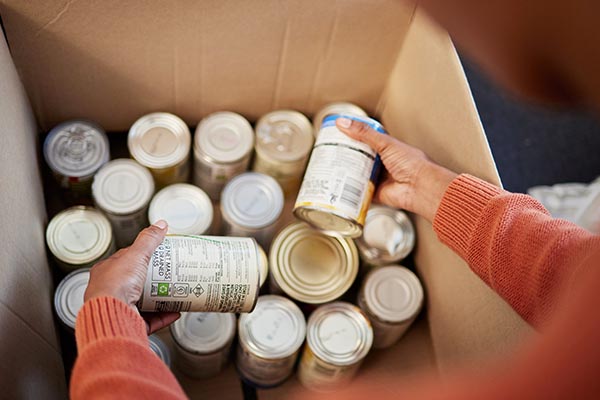
Food Banks: Over the next few years, food banks will become leaders in solving big challenges related to food insecurity and waste.
As it is not easy work ahead, I am so excited with the leaders we’ve got across the country and the energy we’ve got. The fact that they’re simply is not turning back to a version of food banking that you used to be. I’m excited to see where we go. It’s an interesting and exciting moment for food banks to take the lead.
It certainly sounds to me like food banks in Canada are very fortunate to have you in the role that you have, and the great work that you and your colleague do on a daily basis. I appreciate sharing the information and mostly your perspective on leadership. It’s a valuable one. I’ll just underline again that we can serve more when we are well. It summed up so well what I know so many leaders across the country and across our sector are struggling with to want to support their teams. That is the most straightforward, simple and eloquent way I’ve heard that articulated. Thank you for sharing that, Kirstin, and for being on the show.
Thank you. It’s been a great conversation.

